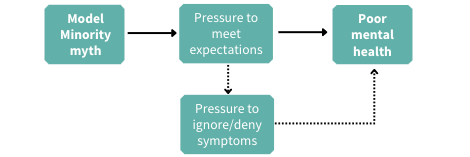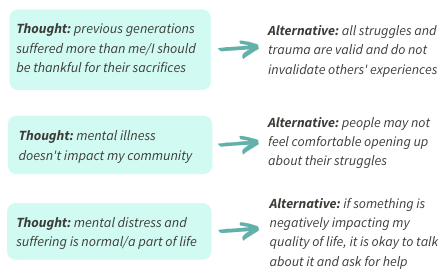Mental Health in Asian Communities
CONTENT WARNING: THIS POST DISCUSSES MENTAL ILLNESS, SYSTEMIC RACISM AND INTERGENERATIONAL TRAUMA
This month is Asian Heritage Month and Mental Health Awareness Month, so we decided that was a fitting intersection for a post topic.
We'll be honest; sometimes we forget that Asians aren't just East-Asians, but rather, Asians are an incredibly diverse category of people who are either from or can trace their immediate ancestry to the continent of Asia.
Also, can we talk about how the continent of Asia is kind of weird? Why is it part of the same landmass that Europe is in but a totally different continent? It also feels like the term Asians have been placed on people from the continent, but the people and countries are so different that most people from Asia don't identify as Asian but rather Indian, Bangladeshis, Afghan, etc.,
That being said, there are many similarities between Asian communities, including, but not limited to, the fact that we share colonial overlords, cultural similarities, collectivist cultures, etc. Many people of Asian descent are recent immigrants (or refugees) to Western nations, increasing our communities' similarities.
So of a diverse but sometimes similar community of people that might not resonate with everyone who is Asian. This is just the tip of the iceberg of such a giant and nuanced issue around the mental health of Asian communities.
Are we getting the whole story?
Only 1 in 4 Asian Americans seek mental health services compared to more than half of the general population.
Canadian Community Health Survey: individuals who identify as South Asian and East Asian are 85% and 74% less likely, respectively, to seek help for a depressive episode compared to those who are white.
Discrimination may explain up to 20% of the East Asian-white mental health gap in Canada.
Why is this happening?
Several different factors may help explain why individuals who identify as Asian could be less likely to utilize mental health services, including...
Social determinants of health
Income and social status
Employment/working conditions
Immigration
Discrimination
Barriers to care
Unaware of resources
Language barriers
Poor service accessibility
Provider–patient interaction
Stigma (self, family, community)
Cultural factors
Cultural beliefs about mental illness
Pressure to be successful, meet societal/family expectations
Intergenerational trauma
Misinterpretation or denial of symptoms
Differences in Cultural Values and Beliefs
Despite being a "mosaic" of cultures, Canadian society continues to place a huge emphasis on individualistic, Western ideals. However, in many Asian cultures, family and community are valued much more highly. In terms of views on mental health, this can manifest in several ways, such as by...
Not recognizing (or denying) mental health symptoms
Wanting, or having a tendency to hide your emotions
Putting the health/wellbeing of others before your own
Not seeking treatment to avoid shaming yourself or others
Differences in religious or spiritual beliefs may also play a role. For example, if someone believes that mental illness is a punishment for sin or a disruption in internal balance, this may affect what kind of help or treatment is sought (if any).
““Mental illness is seen—and I should emphasize, incorrectly—as taking away a person’s ability to care for others. For that reason, it’s seen as taking away someone’s identity or purpose. It’s the ultimate form of shame””
The Shadow of the Model Minority Myth
Model minority myth: the false rhetoric (spread by those centring white comfort and trying to alleviate the responsibility we all have to address social inequities that disproportionately fuck marginalized communities, in particular, Black and Indigenous folk) that Asian communities are more law-abiding, intelligent, successful and more integrated in society than other racial/ethnic minority groups.
“And perversely, the more we use it, the more it hurts us. The “model minority” is an invention to reinforce white supremacy. It requires assimilation into a white supremacist society, which means we’ve had to deny or hide certain aspects of our culture and background.”
Lack of Culturally Competent Care
Current treatments are focused on the individual, ignoring the importance of community and discouraging and/or preventing collective healing.
Many treatments (e.g., psychotherapy) are rooted in Western ideals and do not leave room for alternative, more culturally-appropriate treatments (see our post on culturally competent mental health services!)
Previous negative experiences with the healthcare system can lead to fear and distrust of Western practices.
Mental health problems may appear as physical symptoms and may be missed/misdiagnosed
Many of our parents and ancestors have faced severe trauma, which leads to intergenerational trauma that requires intergenerational healing which the system isn't set up for
“Assumptions that some take for granted, like ‘talking about it will make you feel better,’ may not be shared with some Asian Americans...Taking the steps to understand a patient’s background and remove any assumptions could reduce barriers and sustain ongoing treatment.”
Breaking the wheel
Stigmatization of mental health and normalization of suffering can cause mental health problems to be passed on from one generation to another. Breaking this cycle may require recognizing and challenging potentially harmful thoughts.
According to a recent (2020) survey, 2.2% of 1st generation, 3.5% of 2nd generation and 10.1% of 3rd generation Asian Americans access mental health services.
“I wish that even during the dinner table (family would) just talk about it, just a conversation about mental health, like (asking) how are you feeling, that I don’t think a lot of us really ask?
Or if they (family) do ask (and the response is) I am feeling a bit low or (have) anxiety or breakdown, to be kind with their words, and understand, and not judge, this is a real thing. That would solve so many issues. So many people could be saved.”
Mental Health Resources
If you or someone you know are in crisis, visit an emergency department or call 911
If you or someone you know needs support:
Canada Suicide Prevention Service: 1-833-456-4566
Healing In Colour: healingincolour.com
Althea Therapy: altheatherapy.com
Asians Do Therapy: asiansdotherapy.com
Inclusive Therapists: inclusivetherapists.com
South Asian Therapists: southasiantherapists.org
Asian Mental Health Collective: asianmhc.org
Chimo Services: chimoservices.com
Growth & Solidarity: growthandsolidarity.ca
Hong Fook Mental Health Association: hongfook.ca
Next Steps
Listen and learn
Learn more about cultural factors that may impact ideas about mental health. Actively seek out and explore a variety of resources (note: do not expect others to teach you!). Listen to those with lived experience about the needs and desires of their specific community. Share what you learn with others.
Use your platform for good!
Uplift the voices of those working to support mental health awareness in Asian communities. Help advocate for culturally competent care and increased accessibility of mental health services. Highlight and support Asian creators, businesses (etc.) which can help combat systemic racism.
Feel empowered to take the first step
Help foster resilience by building connections within your community, recognizing how racism and intergenerational trauma may impact mental health and challenging harmful thoughts. Consider seeking mental health support if accessible and available to you (swipe left for some resources).
JOIN the discussion
This project is made up of our team and our community, which is you. So join the discussion!
What has made you hesitant about discussing mental health in your community? Alternatively, what has encouraged you to start conversations about mental health in your community?
What strategies and resources have you found helpful in helping to maintain your mental health?
What is something you wish mental health care providers understood better about mental health in Asian communities?
How can mental health services be changed or improved to better serve Asian Canadians?
DM us on Instagram to share your thoughts! We’d love to hear anything you have to say.
Sources: CBC News, Wu et al., 2020 (SSRN), Mental Health Commission of Canada, McClean Hospital, MedicalNewsToday, Thomson et al., 2015 (Journal of Immigrant and Minority Health), Vox, CAMH, Chinese Canadian National Council for Social Justice, Global News, UofT News



